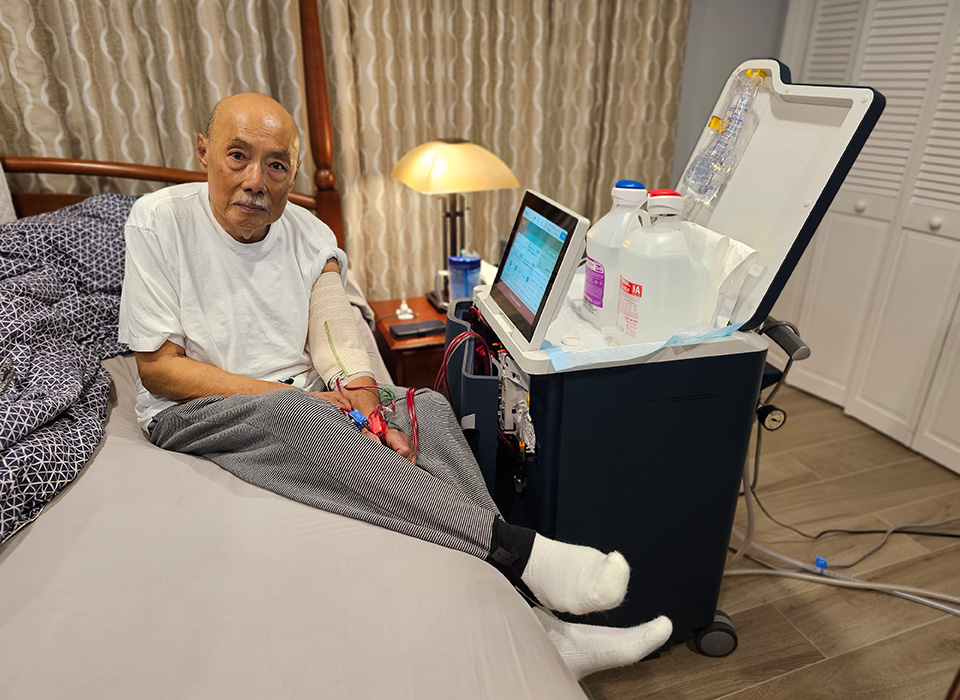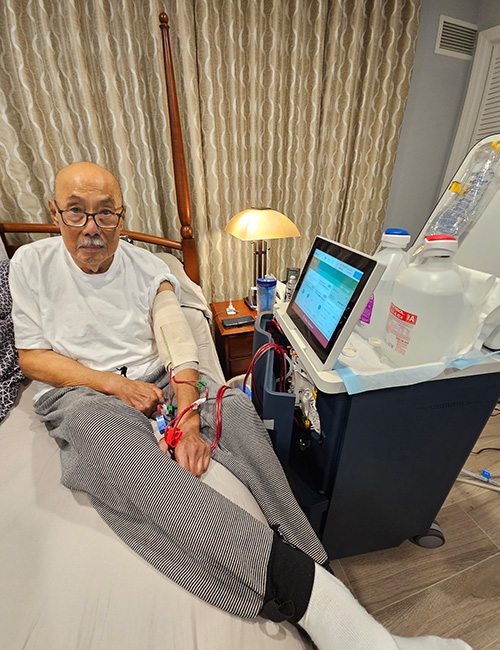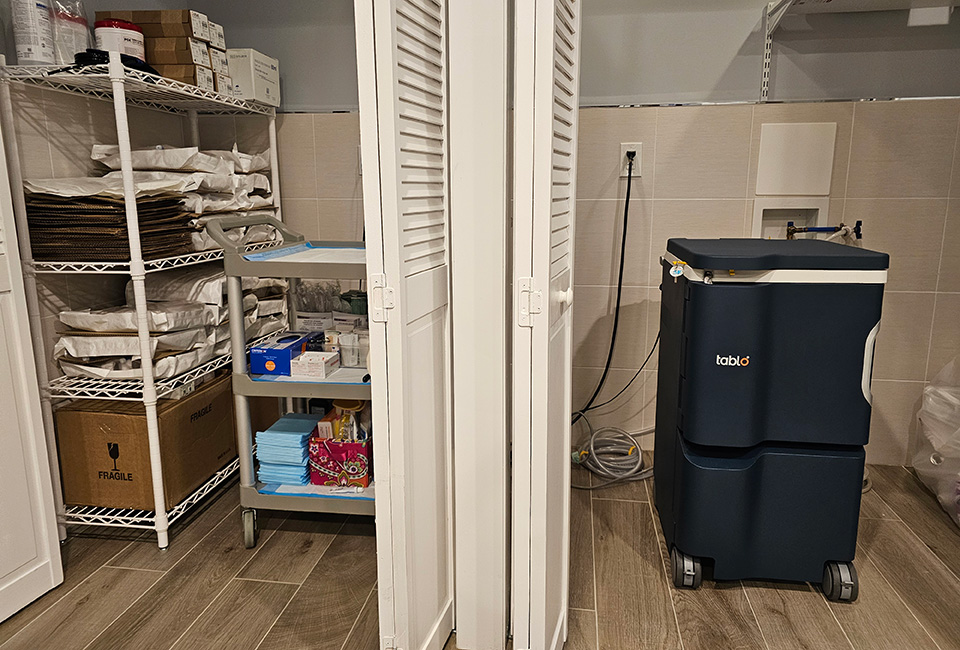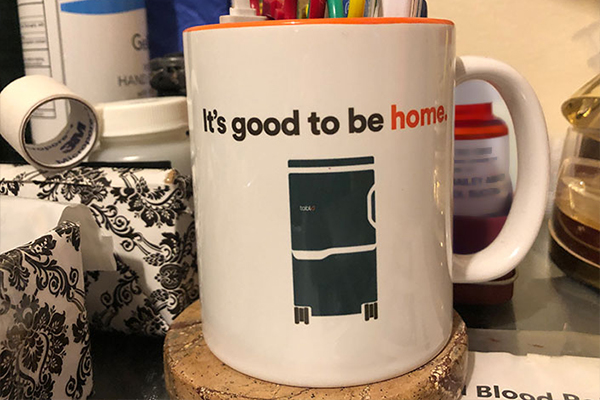Dialysis Won’t Rule Henry’s Life

Summary
As Henry, a New Jersey grandfather, will tell you, dialysis does not have to dominate your days and encroach on your life. Nor is training for home hemodialysis as complicated as you might think. Rather, Henry has spent much of his life successfully finding ways to minimize the inconvenience of dialysis so he could continue to work and do the things he loves. Now, with home treatment from the Tablo® Hemodialysis System, Henry can prioritize time with his family.
It was 1966, the year both “Batman” and “Star Trek” debuted. Henry was a happy, healthy, active seven-year-old when, like millions of other kids, he came down with strep throat. Though painful, the condition is common and treatable. Henry, however, contracted a rare complication. His immune system attacked his kidneys. There was blood in his urine. It was the beginning of a long journey of onerous treatment and intermittent relief.
Doctor’s visits are always scary for kids, but Henry’s experience was scarier than normal. He spent a full month at New York Hospital (now known as New York–Presbyterian Hospital) with the kidney condition. When he finally recovered, there was a hitch: doctors told Henry’s parents that at some point in the next few decades, Henry’s kidneys would fail. It was impossible to say when.
Henry made it to 25 before the rashes and itchiness started. Henry’s kidneys began failing, no longer able to filter his blood. He was in the early stages of end-stage renal disease (ESRD). He would need dialysis (machine-driven blood-cleansing) or a transplant.
On his doctors’ recommendation, Henry turned to the Rogosin Institute, a leading New York City kidney care center. On the medical team’s advice, he started on peritoneal dialysis (PD), a self-administered technique that patients can carry out in their homes. The blood-cleansing process occurs inside the patient’s body employing a tube inserted into the abdomen.
A Transplant Improves Everything, for a While
Two years into PD, there was good news. An organ was available. Henry received a kidney transplant, which his body embraced. Life returned more or less to normal. Henry worked as a businessman, enjoyed family life, and frequently traveled. There were cruises and long vacations as well as jaunts to his favorite destination, Atlantic City, N.J.
The reprieve lasted for eight years until 1994, when his transplanted kidney failed. Soon he was back on PD. Then there were other bumps in the road. Henry had a hernia that needed to be surgically repaired. Following the surgery, he was unable to continue PD and needed to start the other kind of dialysis, hemodialysis, which uses a machine to cleanse the blood outside of the patient’s body.
Henry sought treatment in a dialysis center near his home. He required hemodialysis three times a week for most of 1997 and 1998. Although the treatment was slowing his decline, his health was deteriorating. His labs were not looking good. He was only in his late 30s when doctors told him he was “on death’s door.”
Rogosin’s First ‘Nocturnal’ Patient
Fortunately, Henry wasn’t out of options. Rogosin caregivers described a new program that would allow him to receive hemodialysis at home. Given his infection-free history, Henry would be a good candidate. He could also receive the treatment at night while he slept. The longer duration of overnight dialysis often leads to better blood-cleansing results. And it’s often easier for the patient to tolerate.
Henry soon became the clinic’s first “nocturnal” patient, dialyzing at home six nights a week. The treatment was successful, eventually enabling him to decrease his treatment to five nights a week and then four nights a week.

Home hemodialysis had given Henry new freedom, enabling him to continue his career until 2000. That’s when he developed peripheral neuropathy, or numbness in his extremities. Ever resilient, Henry became an investor, supporting a highly successful venture led by his nephew.
Transition and Training for Home Dialysis on Tablo
Henry’s life remained stable for more than a decade. He bought a big house with lots of land and moved in with his daughter, son-in-law, grandson and granddaughter. The home includes a separate, comfortable dialysis room. He became a Rogosin patient advocate, joining an in-person round table with Rogosin nurses, biomedical engineers, administrators and doctors every month to share his story and provide a patient’s perspective.
And though Henry was done working full time, he wasn’t done traveling. The only problem was that dialysis, as helpful as it was, was getting in the way. His home dialysis machine was far too large and complex to move. Solutions billed as mobile weighed 70 pounds or more – not his definition of mobile.
As well as things had been going for Henry, dialysis technology hadn’t changed since he started hemodialysis more than two decades ago. Earlier this year, however, he discovered hemodialysis technology with a difference.

Newfound Freedom
In Tablo, Henry saw a smarter, easier, better, and more personal home hemodialysis solution. Tablo is as sleek and intuitive as a smartphone, making it easy to learn and use. Networked via Wi-Fi, it easily shares dialysis data with doctors and nurses. It also operates with tap water and a standard electrical outlet.
Henry was excited to switch from an older, complex, industrial-feeling hemodialysis machine that he had been using for over 20 years to Tablo. And after only two training sessions, which Henry and his Rogosin care team attribute to Tablo’s ease of use, Henry was ready to make the switch. While it is not the norm to transition so quickly, Henry proved it is doable.
One of the things Henry appreciates most about Tablo is its flexibility. He’s been able to adjust his treatment so that his adventures to Atlantic City don’t require him to drop everything for a bruising in-center session. Instead, he’s off dialysis on the weekend and can enjoy the Boardwalk without worry.
It’s been a long journey. Ever since that scary hospital stay in 1966, Henry’s life has been full of many unexpected turns, from his diagnoses to his home dialysis experience to the joys of living with his children and grandchildren.
One thing has remained constant, however. Dialysis was not and is not going to rule his life. Tablo, by making his schedule more flexible than ever, lets him keep his promise.

